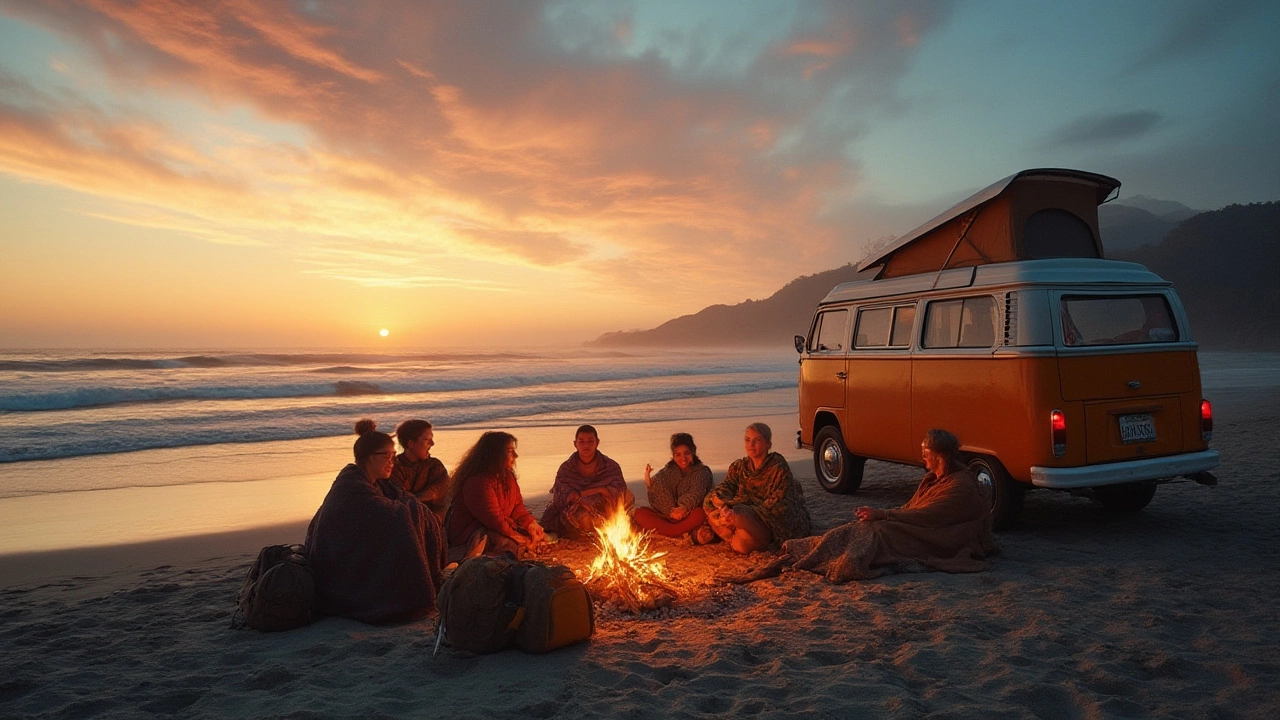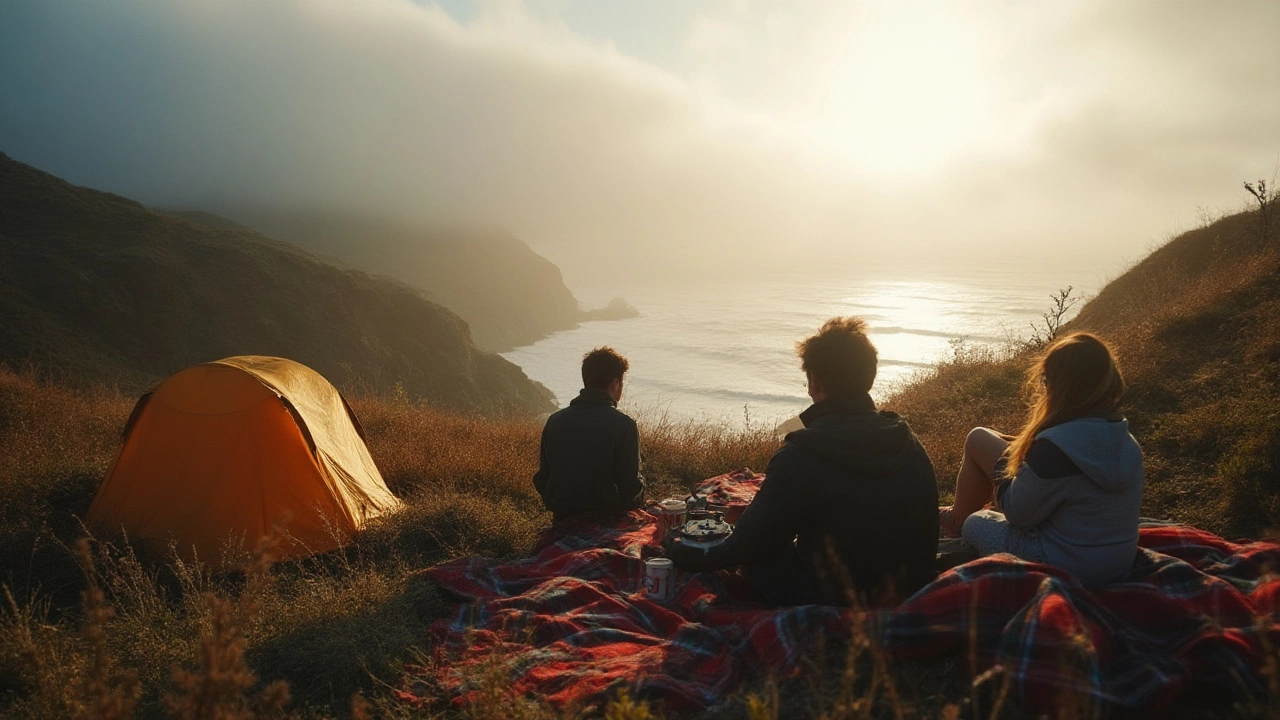Free Beach Camping in California: Where and How to Go Wild Camping by the Coast
 Jul, 17 2025
Jul, 17 2025
Picture this: You’re sitting around a campfire, toes dug in cool sand, and the Pacific’s white noise lulls you into a trance. Beach camping in California is a daydream shared by plenty. But ask most folks if you can actually pitch your tent for free, and you’ll get a laugh or a warning. The truth? Free beach camping in California isn’t a fairytale—but the rules, locations, and realities aren’t what Instagram makes them out to be.
Digging Into the Realities: Why Free Beach Camping is Rare in California
California’s legendary coastline stretches over 800 miles. From the Oregon border to Mexico, it’s a magnet for surfers, road trippers, and van dwellers. But snagging a patch of sand for free, away from crowds, with your tent under the stars? Not as easy as it sounds.
Here’s the rub. Much of California’s coast is either protected as state parks, privately owned, or falls under city and county jurisdiction. The days of pulling over and camping just anywhere on the beach are mostly gone, thanks to property laws, crowds, and environmental rules. Rangers and local law enforcement actually do patrol the obvious spots—especially popular beaches like Malibu, Santa Cruz, or around San Diego.
A lot of folks get tripped up by the phrase "public beach." Sure, beaches are public by law below the mean high-tide line—but that doesn’t mean you can legally camp overnight anywhere you like. Many local ordinances ban overnight camping, fires, and even sleeping in your car or van along oceanfront roads.
So, can you get away with it if you’re sneaky? Sometimes, yes. Will you likely get caught, fined, or asked to move? Also yes. And the fines can be brutal. According to California State Parks data, illegal camping on the coast can rack up fines between $100 and $300 per person—plus a record of the incident.
Hidden Gems and Loopholes: Free Beach Camping Spots That Still Exist
Even with the restrictions, there are a few places left where you can camp for free, or almost free, near a California beach if you know how. But here's where it gets real: you’ve got to be flexible, resourceful, and aware of the risks. Most legal free beach camping is miles off the main highways, involves a hike, or sits outside city limits.
The classic loopholes? Try camping on BLM (Bureau of Land Management) land near the coast. Hardly any BLM land sits right on the sand in California, but it does exist—mostly in the far north or south. Take Centerville Beach near Ferndale up in Humboldt County. There are spots on the bluffs overlooking the Pacific where you can legally dry camp—no services, no reservations, and usually no fees.
Head down to the Los Padres National Forest’s coastal edge above Big Sur. You’ll find backcountry campsites with staggering views, though you’ll be a steep hike or a winding dirt road away from putting your feet in the water. Many folks “stealth camp” in parking lots or pullouts along Highway 1, especially between Gorda and Lucia, but this is riskier than ever and officially not allowed.
One of the few nearly oceanside "free" areas left is at Point Mugu State Park’s Sycamore Canyon Fire Road—we’re talkin’ a remote, more primitive experience, and you’ve got to haul your stuff in. Campers sometimes set up on beaches beside the mouth of the Eel River near the Lost Coast. But even here, you need to check with local rangers since rules shift after storms or in wildfire seasons.
Other people head for technically non-beach national forests (like Los Padres or Cleveland) and camp within walking distance of the ocean. This expands your options about a mile or two—and often gets you those sweeping sunsets with none of the No Camping signs.
Here's a cheat-sheet
| Region | Best Option | Legal? | Tip |
|---|---|---|---|
| Humboldt/North Coast | Centerville Beach BLM Land | Yes | Go in off-season, bring water |
| Big Sur | Backcountry National Forest | Yes (in marked areas) | Check fire bans, carry in/carry out |
| Ventura | Point Mugu Sycamore Road | Gray area | Arrive late, keep it minimal |
| San Diego | San Onofre Bluffs | No (fee required) | Try stealth van camping off-season |
Always scope out sites in advance, search for the latest local rules, and—if lost—call the ranger station before you shoulder your pack.

Legal Risks and Survival Strategies for Free Camping
Let’s talk about the less-fun side: the legal and practical risks. On California’s beaches, enforcement varies wildly by location and season. Some stretches are almost wild west, with no one for miles. Others are crawling with rangers intent on keeping tourists in line.
What happens if you’re caught? Most times you’ll get a warning, especially if you look like you’re picking up after yourself and moving on by sunrise. But repeat offenses or camping with large groups can mean a citation or big fine. Law enforcement can (and sometimes will) confiscate equipment—especially if there’s a fire ban or you’ve got dogs off leash in protected dunes.
The best bet if you’re determined to find a spot: follow Leave No Trace principles religiously. That means packing out every scrap of trash, using portable toilets, and never building a fire unless you’re 100% sure it’s permitted. Setting up camp discreetly, well off main trails and parking lots, helps avoid negative attention. Van lifers sometimes use blackout curtains and park in sparsely used turnouts, but this is always a roll of the dice.
Here are some street-smart free camping tips I’ve picked up from my own year backpacking California’s coastline with my wife Lillian:
- Never camp in the same spot twice during a trip. Rangers remember faces.
- Arrive after dusk; break down at sunrise. The less time you’re visible, the better.
- Don’t light fires unless it’s legal. Always check CAL FIRE’s daily bulletins.
- Use apps like iOverlander and FreeCampsites.net, but take reviews with a grain of salt. Spots go viral and get closed fast.
- Leave zero trace—seriously. You’re not invisible, but you can make it look like you were never there.
- If approached, apologize, offer to pack up, and never argue. Most rangers are just trying to protect limited resources.
Realistic Alternatives: Cheap and Beautiful Beach Camping You Can Actually Do
Okay, so what if totally free beach camping is a unicorn? You don’t need to bust your bank to get that same epic view. California is loaded with low-cost state beach campgrounds and walk-in sites that are almost as good as wild camping, minus the stress.
For as little as $25 to $45 per night, you’ll find stunning campgrounds at places like Doheny State Beach, Morro Strand, and Sunset State Beach. ReserveAmerica and the California State Parks website list hundreds of oceanfront options. On busy weekends, you’ll need to reserve months ahead—but midweek in the offseason, you can often just roll up and ask for a site.
If you insist on the free experience, consider camping just inland within state or national forests and hitting the beaches during the day. Some personal favorites: Limekiln State Park (Big Sur), Manchester Beach (Mendocino), and El Capitan State Beach near Santa Barbara. All offer direct access to the sand, amazing sunsets, and way less risk of fines.
Here’s a pro tip: Many state parks have "hike or bike" sites for $10–$15, reserved exclusively for non-motorized travelers. If you’re up for pedaling or hoofing it with your gear, you’ll always find a spot—even at places booked solid for car campers. I once snagged a private bluff-top site off the Coast Trail with only my backpack and a smile, while car campers were turned away.
Above all, know the free beach camping California rules and keep your plan loose. Most of that wild coastal freedom still exists, as long as you don’t expect it to be totally free. Getting creative with your timing and destination can make all the difference. You might not get the textbook empty beach every night—but if you crave a real adventure, California’s wild coastline still delivers if you’re ready to adapt and go with the flow.